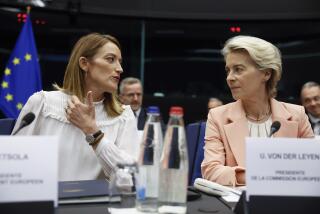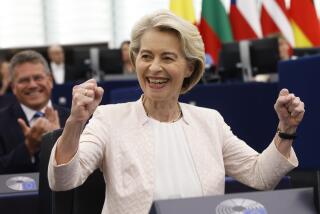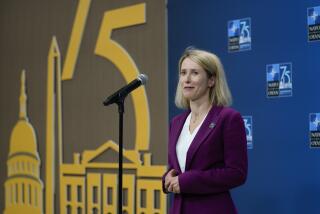Italian Selected to Lead Beleaguered EU Panel
- Share via
BERLIN — European Union leaders Wednesday nominated former Italian Prime Minister Romano Prodi to preside over the scandal-plagued European Commission, tackling the only quickly resolvable task at a summit riven by financial disputes and overshadowed by NATO’s bombing of Yugoslavia.
German Chancellor Gerhard Schroeder, host of the 15-nation summit in this evolving capital of the new Europe, applauded Prodi’s success in reforming the notoriously messy finances of his home country during his time as premier, which ended in October. He is “someone in keeping with every expectation of the European Union in the current situation,” Schroeder said.
Prodi will succeed Jacques Santer, who resigned last week along with all 19 other commissioners after accusations of widespread corruption and mismanagement in the Brussels-based EU administration.
“I am delighted for Italy,” Prodi, in Frankfurt for a banking conference, told journalists. But he noted that his first order of business, if confirmed by the European Parliament, will be “to make the machinery work again.”
The choice of the modest, 59-year-old technocrat to put the European administrative house in order produces at least one success at a summit racked by disagreements over farm subsidies and burden-sharing for the EU’s $92-billion annual budget. Although the summit was scheduled to wrap up today, the leaders conceded that they might need to work through Friday to reach agreement on the reform package known as Agenda 2000.
Much is at stake for Schroeder, as his 5-month-old government is under fire for shifting new tax burdens onto industry while failing to curb nearly 12% unemployment. He promised Germans a reduction in their hefty EU contributions--one-third of the budget--but appeared unlikely to wrest more than symbolic relief from other members.
Nearly half the EU budget is spent on agriculture subsidies, and European farmers have stridently denounced proposals to slow annual growth in price supports. Underscoring their demands for continued EU payments, nearly 4,000 farmers protested on the outskirts of the summit, driving tractors through the historic Brandenburg Gate less than a mile from the hotel where the leaders were meeting.
Against a backdrop of North Atlantic Treaty Organization bombing raids ordered against Yugoslavia for refusing to make peace in the Serbian province of Kosovo, the hand-wringing and squabbling among the European leaders over pocketbook issues cast further aspersions on the authority and resolve of the world’s biggest economic alliance.
The EU heads of state and government offered a show of unity behind NATO’s decision to use force in the troubled Balkans, but France and Greece have expressed reservations about military intervention in Kosovo, and fears were rife at the summit that airstrikes might only intensify the costly and disruptive flow of refugees into neighboring countries.
EU leaders had earlier indicated that filling the commission presidency would not be a priority for the summit, even though Prodi had clearly emerged as the favorite.
An owlish, soft-spoken economics professor, Prodi is widely respected in Europe for getting his country in shape for European monetary union. His 30 months as prime minister, the second-longest term in Italy’s postwar history, was a rare period of calm in a country used to changing governments every few months.
*
Times staff writer Richard Boudreaux in Rome contributed to this report.
More to Read
Sign up for Essential California
The most important California stories and recommendations in your inbox every morning.
You may occasionally receive promotional content from the Los Angeles Times.














